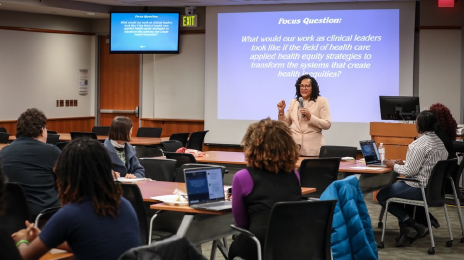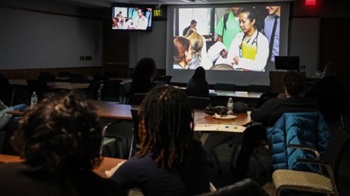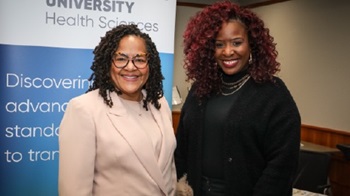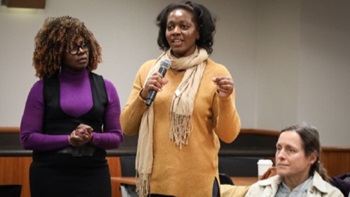Partnership's Film Series Encourages Time To Reflect And Sit With Emotions Around Health Disparities

As Black History Month drew to a close, Henry Ford Health + Michigan State University Health Sciences held an enlightening screening and discussion for their second Henry Ford + MSU Health Equity Film Series featuring “The Deadliest Disease in America.”
“One of the things I'm most excited about with this second installment of the Henry Ford + MSU Health Equity Film series is that it's really doing the work that we envisioned for the partnership to do which is to educate and equip individuals with the right strategies and tools to combat health disparities,” said Marita Gilbert, Ph.D., who serves as the Henry Ford + MSU DEIJ committee chair and is the MSU College of Osteopathic Medicine associate dean of Diversity and Campus Inclusion.
 About 250 Henry Ford, MSU, and community members registered to participate in the conversation and view the film that explores the history of racism in American healthcare and present-day disparities in medical treatment.
About 250 Henry Ford, MSU, and community members registered to participate in the conversation and view the film that explores the history of racism in American healthcare and present-day disparities in medical treatment.
“The film really ignited a thought-provoking discussion on the profound impact of racism throughout the decades in health care,” said Krista Walker, Ph.D., Michigan State University College of Nursing DEI Assistant Dean.
This history includes the 100,000-150,000 poor African American women who were sterilized annually under federally funded programs in Alabama in the 1970s. The film noted a more recent disparity of Blacks, Latinos, and Native Americans who accounted for approximately 45.5% of the deaths of COVID-19 in 2020, despite only making up 33% of the U.S. population.
After the film, discussion was led by Renée Branch Canady, Ph.D., MPA, a national thought leader in the areas of health inequities and disparities, cultural competence, and social justice. In-person participants also had the chance to receive a signed copy of Canady’s book Room at the Table: A Leader's Guide to Advancing Health Equity and Inclusion.
 “Any time people share of themselves, I know that we're tapping into that authentic place,” said Canady on the event’s discussion. “People were talking about memories of their mother and painful encounters that they had in health care. That lets me know it wasn't a ‘check the box’ conversation, but that they were really thinking deeply and contributing to the dialogue.”
“Any time people share of themselves, I know that we're tapping into that authentic place,” said Canady on the event’s discussion. “People were talking about memories of their mother and painful encounters that they had in health care. That lets me know it wasn't a ‘check the box’ conversation, but that they were really thinking deeply and contributing to the dialogue.”
“I wish that there were more changes institutionally as well as structurally that should have already been done to ensure that everyone is receiving adequate care,” said event participant and community member Alexa Cooper.
This film series event also offered CNE/CME contact hours for professionals, which focused on educating health care professionals on the historical factors and mitigation strategies that influence bias and health inequity in modern-day healthcare settings.
 “The feeling that stayed with me the most tonight was to be a part of the change,” said Larissa Miller, Ph.D., R.N., Henry Ford + MSU nursing education committee member and MSU College of Nursing assistant professor and professional development coordinator. “I'm hoping that all of the young providers here tonight just feel inspired to not wait for somebody else to do it but to step in and just be that change.”
“The feeling that stayed with me the most tonight was to be a part of the change,” said Larissa Miller, Ph.D., R.N., Henry Ford + MSU nursing education committee member and MSU College of Nursing assistant professor and professional development coordinator. “I'm hoping that all of the young providers here tonight just feel inspired to not wait for somebody else to do it but to step in and just be that change.”
Many participants commented that the event was informative and powerful. As one individual stated, “Even though I was on zoom, the facilitators and the participants’ vulnerability to share experiences, emotions, and ideas, as well as the desire to work to make things better was palpable.”
The full discussion of the night’s event is available to view at the Henry Ford + MSU YouTube Account.
This event was sponsored by the Henry Ford + MSU DEIJ Committee and Michigan State University College of Nursing.
